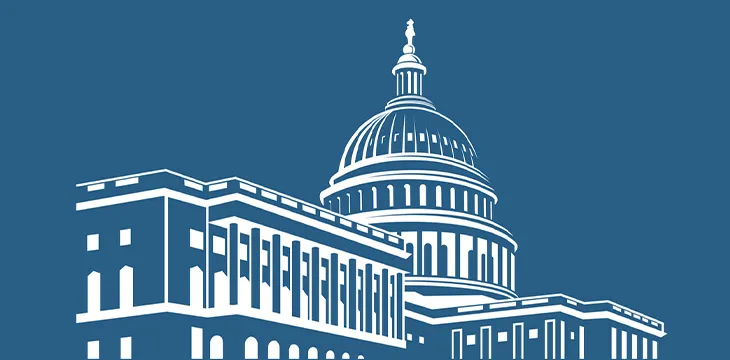|
Getting your Trinity Audio player ready...
|
Patrick McHenry, Chairman of the House Financial Services Committee, announced on January 12 his appointments for Chairs of the committee’s subcommittees, with a distinctly ‘pro-innovation’ picture emerging.
The business of Congress had begun to get underway again after a voting fiasco for the history books, which saw Congress forced to vote 15 times before Republican Kevin McCarthy (R-CA) finally received enough votes to become Speaker of the House.
Chairman Patrick McHenry (R-NC) of the House Financial Services Committee announced his Republican subcommittee chair appointments, stating, “This slate of subcommittee Chairs will be the drivers of our policy agenda centered around economic prosperity for all Americans.”
The pro-innovation McHenry emphasized how his chosen Chairs would be charged with “increasing opportunities for all investors, expanding access to innovative financial products, or ensuring the safety and soundness of our financial system.”
The key appointments from a digital asset perspective are the Subcommittee on Capital Markets and the Subcommittee on Digital Assets, Financial Technology and Inclusion.
Bad news for regulation by enforcement
Rep. Ann Wagner (R-MO) takes charge of the former subcommittee, which oversees the operations and policy development of the regulatory bodies: the Securities and Exchange Commission (SEC), the Municipal Securities Rulemaking Board (MSRB), the Financial Accounting Standards Board (FASB), and the Public Company Accounting Oversight Board (PCAOB).
A notable task will be monitoring and responding to the SEC’s regulatory agenda, which Wagner described as “harmful rulemakings that stifle growth and inhibit investment.”
This is clearly a warning shot in the direction of SEC Chairman Gary Gensler, under whose stewardship the organization has become synonymous with a ‘regulation-by-enforcement’ approach to the digital asset market.
For better or worse, it seems this approach is out of favor on the Hill, and the incoming Digital Commodities Consumer Protection Act (DCCPA) will be a further nail in its coffin when it comes into force. If the act passes into law unscathed and largely unchanged, it will hand previously contested jurisdiction over digital commodities trading, including BTC and Ether, over to the Commodities Futures Trading Commission (CFTC)—a regulator that has been seen in the past as less heavy-handed, although this is debatable.
When making the appointment, McHenry further emphasized the preference for a less trigger-happy enforcement approach, praising Wagner’s “outspoken support for commonsense solutions.”
Digital Assets Subcommittee
The other key appointment for the digital asset industry was Rep. French Hill (R-AR), chairing the Subcommittee on Digital Assets, Financial Technology and Inclusion.
A former community banker and U.S. Treasury official, Hill has led task forces on financial technology and AI, and will preside over a subcommittee whose brief is providing “clear rules of the road among federal regulators for the digital asset ecosystem” and “developing policies that promote financial technology to reach underserved communities.”
Much like Wagner, Hill was keen to highlight the promotion of innovation amongst his goals, but did also—perhaps in the light of the FTX fallout—qualify this desire with the word “responsible,” stating:
“At a time of major technological advancement and change in the financial sector, it is our job to work across the aisle and promote responsible innovation while encouraging FinTech innovation to flourish safely and effectively in the United States.”
With all the discussion currently in the digital asset space revolving around prosecutions and losses, it’s likely this encouraging of ‘responsible innovation’ will be the compromise approach de jour, in the short term at least, for the pro-business Republican-controlled congress.
McHenry underlined this point when announcing the appointment by saying:
“I look forward to working with him [Hill] to provide clear rules of the road for this ecosystem that protect consumers, while allowing innovation to thrive here in the U.S.”
Other appointments of note
The other Republican chair appointments were Rep. Blaine Luetkemeyer (R-MO), taking charge of the Subcommittee on National Security, Illicit Finance, and International Financial Institutions; Rep. Bill Huizenga (R-MI) heading the Subcommittee on Oversight and Investigations; Rep. Warren Davidson (R-OH) chairing the Subcommittee on Housing and Insurance; and the new chair of the Subcommittee on Financial Institutions and Monetary Policy will be Rep. Andy Barr (R-KY).
The latter appointment is also worth remembering, as the Subcommittee on Financial Institutions and Monetary Policy oversees the operations and policy development of the prudential financial regulators, the Consumer Financial Protection Bureau (CFPB), and the Federal Reserve and its 12 reserve banks, as well as being tasked with “identifying policies that grow and stabilize the financial system and broader economy.”
Barr said after his appointment that he was looking forward to “exercising much needed oversight of other key financial regulators, including the OCC, FDIC, NCUA, CFPB and FSOC.”
Again, in Barr’s comments, the scale of priorities seemed to dip to the fostering of growth over cautious oversight, but taking the current temperature of the digital asset debate in Washington DC, it’s unlikely caution will be completely sidelined when it comes to regulation and enforcement going forward.
Watch: U.S. Congressman Patrick McHenry on Blockchain Policy Matters

 07-06-2025
07-06-2025 





